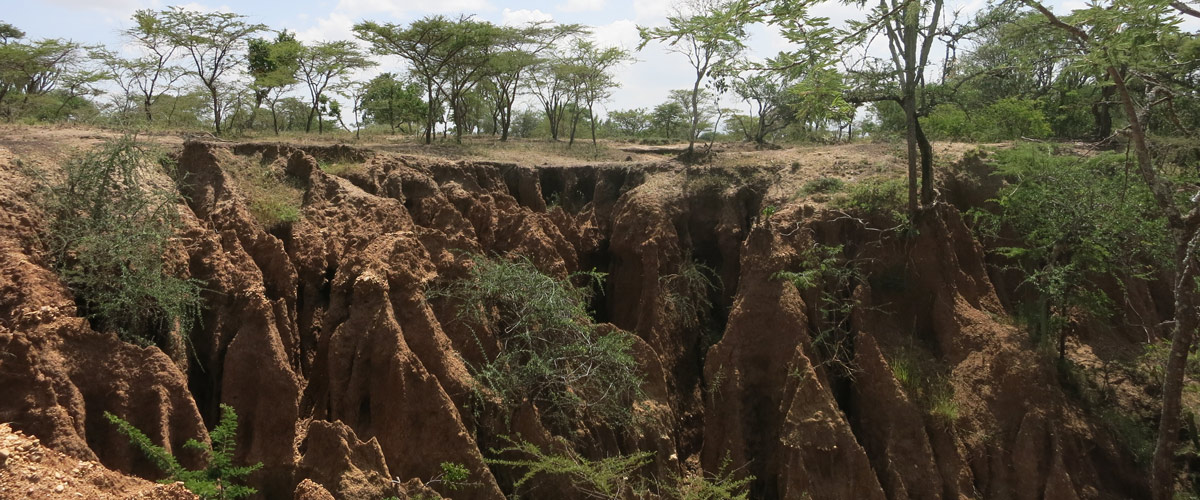
Agroecological Options for Food-Energy-Environment Nexus
Lead Organization:
National Forestry Resources Research Institute (NaFORRI)
Partner Organizations:
Bugobero, Namabya, and Namboko district local governments, Mbale Coalition Against Poverty (Mbale CAP), World Agroforestry (ICRAF), International Research Center, Sub-county local governments, Farmer groups, Local NGOs, Community-based research organizations, Extension workers
Community of Practice:
Countries:
Uganda
Duration:
5/2021—5/2023
Overview:
Geological formations and steep slopes make Uganda’s eastern highlands prone to landslides. Severe deforestation and poor farming practices exacerbate soil and water degradation, leading to severe poverty. Partners have long promoted land management practices; however, adoption levels remain low because of plot-level non-participatory approaches and the myopic understanding that sustainable watersheds can be achieved simply by enforcing regulations.
Effective watershed management should be about developing complementary models for the protection and rehabilitation of watersheds through community participation schemes, public-private partnerships, and private investment structures (UNEP, 2015). Participation at household level is driven by the immediate benefits from food and energy products. Flood control, water purification, and soil erosion control are additional direct benefits that motivate downstream populations. Using incentive and other market-based mechanisms to promote sustainable land-use and watershed management practices needs to be explored. A landscape approach has potential to meet social and environmental objectives at local scales while aiding national commitments to address ongoing global challenges (Reed et al., 2016).
Applying a combination of community-based landscape-level approaches with market-based methods can strengthen the participation of local communities and the private sector, reversing ecosystem degradation.
Grant Aims:
The challenge is how to improve access to food, energy, and ecosystem services in erosion-prone watersheds. This project aims to promote sustainable watershed management through agroecology practices and market-based models.
- Strengthen stakeholder capacity for collective action in agroecological watershed management; document suitable, locally adaptable agroecological interventions for food and nutrition security and land management practices in Uganda’s Mount Elgon area; strengthen the capacity of key watershed actors, including smallholder farmers, NGOs, and local governments in the uplands and private utility companies and water users downstream; participate in watershed management planning and management processes; establish demonstration sites of at least three tree-based agroecological watershed management interventions including agroforestry.
- Test at least two market-based mechanisms for agroecological land management in the micro catchments; co-develop locally adaptable criteria and indicators for sustainable agroecological watershed management.
- Support local governments to develop relevant regulation to foster adoption of agroecological watershed management, especially agroforestry options for soil and water conservation, in district plans and budgets.
Outputs and Outcomes:
Outputs
- A basket of suitable, locally adaptable agroecological interventions for food and nutrition security and land management
- A network of actors, including smallholder farmers, NGOs, and local governments in the uplands and private utility companies and water users downstream, participating in watershed management planning and management processes; at least 600 farmers and 15 extension staff trained
- At least 15,000 soil conservation structures established as demonstration sites of at least three agroecological watershed management interventions including agroforestry
- A set of criteria and indicators of successful agroecological watershed management, evidence generated jointly, and results shared widely through a mobile platform and monitoring framework
- At least one model of a market-based mechanism as an incentive for land management by smallholder farmers
Outcomes
- By documenting and demonstrating locally adaptable agroecological practices, farmers will more often adopt these practices to increase land productivity and access to clean water and energy.
- Capacity strengthening practices in the innovation platforms will enable local governments to include agroecological practices in the agricultural and natural resources management plans and budgets. Local governments will facilitate the process of formulating regulations to ensure compliance with community-level implementation of agroecological practices.
- The market-based mechanism model will foster private companies to increasingly contribute to ecosystem activities that promote conservation of soil and water sources in the study catchment.